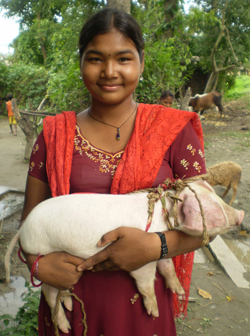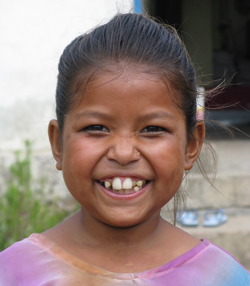
Creative Solutions for Indentured Daughters

When our President, Som Paneru, became aware of the practice of selling these daughters, he visited the Dang District with a Nepali friend who came from the region. As they discovered, the root of the problem is simply that the families could not do without the income their daughters‘ labor brought in. Horrific as this practice is, when you experience the poverty in the area, it is not difficult to have some sympathy for the parents. Some families have 10 or 12 children. (Most of these mothers never received an education, which could have introduced them to family planning.) In Nepal, the average income is $210 per year for an entire family, so the average of $40-70 that a daughter’s labor brings is important. According to a survey we conducted, in about 16% of the cases of bonding children, neither the parent nor the child receives any money at all. The child works for room and board only – usually a spot on the floor and leftovers; and the only advantage to the family is that it is relieved of the burden of support.
As we talked with the villagers, we began to develop a plan. We learned that the „selling“ of the daughters into virtual slavery takes place each year on a holiday in January called Maghe Sakrante, when annual labor contracts are renewed in this community. During this time, labor contractors come to the villages of the area to “buy” the children. Although the contracts may imply that the child will return each Maghe Sakrante before renegotiating the bargain, in practice the girls often do not return; the new agreement is entered into without their consent. If a child is returned, in most cases she is immediately sold to the same or another buyer. If you can believe it, a couple of little girls sent off to work were only six years old, contracted away to work far from home as baby sitters.

NYF decided to try an experiment. We asked 37 families to bring their daughters home for the January holiday. As an incentive, we promised the families that if they allowed their daughters to live at home and attend school (at NYF’s expense) instead of being sent off to work, we would compensate them for their daughters‘ lost wages.
At first we planned to reimburse the families in cash, but we decided to nose around the village before making the offer. And it’s a good thing we did. Alcoholism is rife in the community, and the mothers begged us not to give money to their husbands. We also learned how valuable piglets are in this culture. So, instead of money, we gave each participating family a piglet (or a goat, if they preferred), which they could raise on kitchen scraps and ultimately sell for about the sum they received for their child’s labor. (And often more, if they breed the animal.) We also offered a kerosene lamp and two liters of kerosene a month – items of great value in this area without electricity.
A donation of $100 will rescue a girl from indentured servitude, let her come home to live with her family, and provide her family with a baby goat or piglet as compensation for the lost wages. She is then free to go to school, and she may be the first member of her family to get an education.
The girl herself received a school uniform, school books (imprinted with a slogan against indentured servitude), pencils, a book bag, and – best of all – an education. We also gave each girl a colorful Tharu costume. The labor contractors sometimes bring back to the village at Maghe Sakrante a „city girl,“ a bonded laborer from the area decked out in pretty clothes, to encourage the local girls to enlist. The Tharu costume was an antidote to this temptation.
How many families took us up on this initial offer? Read on….
How to Rescue Nepali Girls from Virtual Slavery
For only $100, NYF enables a girl to go to school and gives her family a piglet or goat.